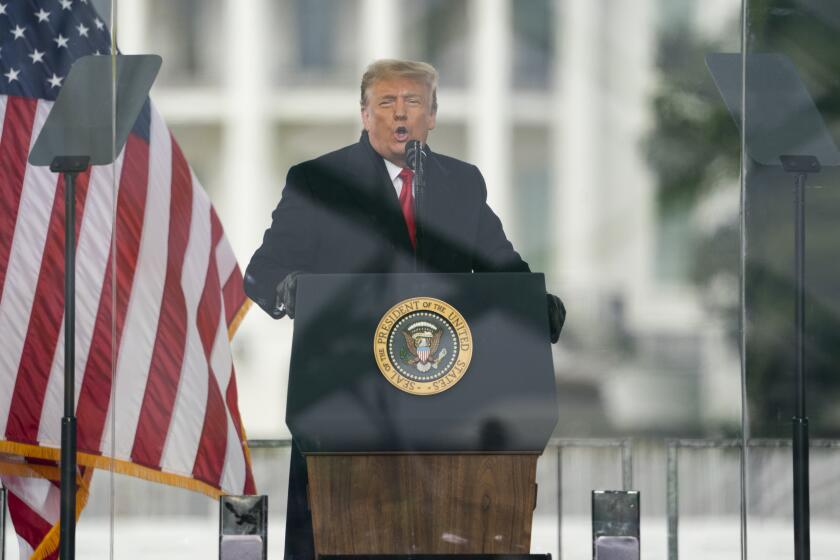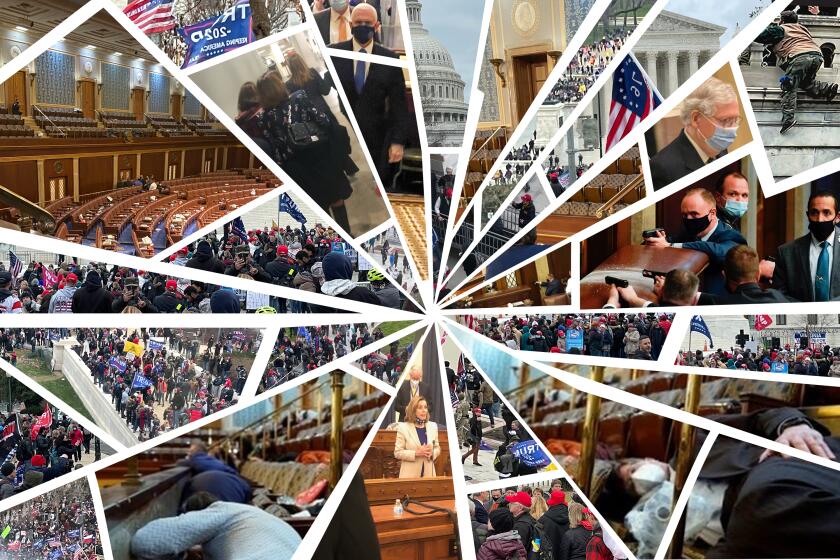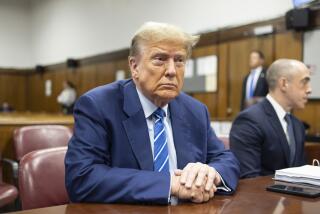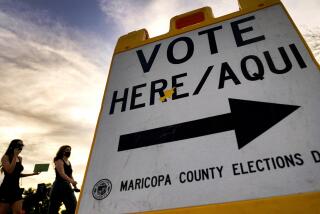Supreme Court appears wary of blocking Trump from Colorado ballot

WASHINGTON — The Supreme Court justices gave a favorable hearing to former President Trump on Thursday, suggesting they will clear the way for him to seek election this year despite the mob attack on the Capitol that followed his loss in 2020.
The justices, both conservative and liberal, said they were skeptical of giving individual states the constitutional authority to disqualify candidates for a national office like the presidency.
“Why should a single state make this determination for the rest of the nation?” Justice Elena Kagan said. “It sounds awfully national.”
“It just doesn’t seem like a state call,” Justice Amy Coney Barrett added.
In December, the Colorado Supreme Court became the first and so far only state or federal court to rule that Trump must be removed from the primary ballot because he is not qualified to hold office again.
The Colorado Supreme Court removes the former president from the state’s primary ballot, saying he is ineligible to be president due to his role in the Jan. 6 attack.
By a 4-3 vote, the state judges said Trump had violated Section 3 of the 14th Amendment, which says no person may “hold any office, civil or military” after having taken an oath to support the Constitution and later “engaged in insurrection” against the United States.
“We are here because, for the first time since the War of 1812, our nation’s Capitol came under violent assault. For the first time in history, the attack was incited by a sitting president of the United States to disrupt the peaceful transfer of presidential power,” said Denver attorney Jason Murray, who represented the Colorado voters who sued to disqualify Trump.
But he quickly ran into steadily skeptical questions from the justices. They spent little time on whether Trump’s actions leading up to Jan. 6 amounted to engaging in an insurrection.
Instead, they took turns disputing the notion that state judges in Colorado or elsewhere may decide whether a presidential candidate is qualified.
Chief Justice John G. Roberts Jr. said the 14th Amendment was adopted by the Reconstruction Congress to limit the authority of the states. “Wouldn’t that be the last place that you’d look for authorization for the states, including the Confederate states, to enforce the presidential election process?” he asked.
He predicted that if the high court were to endorse the Colorado ruling, other states “in very quick order” would make their own decisions on who can run for president, and some of them may seek to disqualify Democrats.
Justice Brett M. Kavanaugh repeatedly cited an 1869 decision holding that Congress had to pass a law to enforce the 14th Amendment’s disqualification rule. It was not up to each state, he said.
He also noted that while federal law makes it a crime to “incite an insurrection,” Trump had not been charged under that law.
The tenor of Thursday’s argument suggests a solid majority of the court, and perhaps all nine justices, will rule for Trump and reverse the Colorado court’s decision.
Only Justice Sonia Sotomayor sounded as though she may vote against Trump.
The court with Roberts taking the lead is likely to turn out an opinion in a few weeks. March is the prime time for primary elections in much of the nation.
By next week, however, the justices will have before them another Trump appeal that could decide whether he goes on trial this spring for the Jan. 6 attack.
Last week, the U.S. Court of Appeals for the District of Columbia Circuit rejected Trump’s claim that former presidents are immune from being prosecuted for their actions while in office. The appellate judges said they would keep the criminal case on hold until the Supreme Court decides whether to hear Trump’s appeal of that ruling.
If the justices quickly reject Trump’s appeal, his trial may be scheduled to begin in April or May. But if the justices decide to hear the appeal, the trial is likely to be postponed until late summer or fall.
Leading up to Thursday’s argument, some legal experts portrayed the disqualification issue as a test of the conservative court’s devotion to originalism.
Legal scholars and historians told the justices in friend-of-the-court briefs that the words and history of the 14th Amendment call for disqualifying Trump. They said the members of the Reconstruction Congress were determined to prevent insurrectionists from gaining power and subverting American democracy.
Lawyers for a group of Colorado voters are focusing on the January 2021 assault on the Capitol and former President Trump’s words and actions.
But the six conservatives are also GOP appointees, and Trump’s lawyers said it would be anti-democratic to remove the Republican presidential front-runner from the ballot.
And that argument appeared to resonate with most of the justices, including its three Democratic appointees.
The former president is “the presumptive Republican nominee and the leading candidate for president of the United States,” Trump’s lawyers said in their closing brief filed on Monday. “The American people — not courts or election officials — should choose the next president of the United States. Yet at a time when the United States is threatening sanctions against the socialist dictatorship in Venezuela for excluding the leading opposition candidate for president from the ballot ... [the Colorado lawsuit] asks this court to impose that same anti-democratic measure at home.”
Much of Thursday’s argument was devoted to procedural and technical objections to the Colorado ruling.
In his legal argument for Trump, Texas attorney Jonathan Mitchell said the president is not “an officer of the United States” and is therefore not covered by Section 3 of the 14th Amendment. He said that officers are appointed, not elected, and that the 14th Amendment does not mention the president or vice president.
Many historians and legal scholars call this claim absurd.
It would mean the Reconstruction Congress sought to block former Confederates from holding “any office” across the nation except the presidency.
But by the argument’s end, it appeared the justices will decide the case without ruling on whether the former president was covered by the 14th Amendment or whether he led an insurrection before leaving office.
Three years ago, Times reporter Sarah D. Wire wrote about her experience inside the Capitol on Jan. 6, 2021. Now, with the aid of surveillance footage recently made available by the House and additional firsthand accounts, Wire provides a more expansive view of that day.
More to Read
Get the L.A. Times Politics newsletter
Deeply reported insights into legislation, politics and policy from Sacramento, Washington and beyond. In your inbox three times per week.
You may occasionally receive promotional content from the Los Angeles Times.














